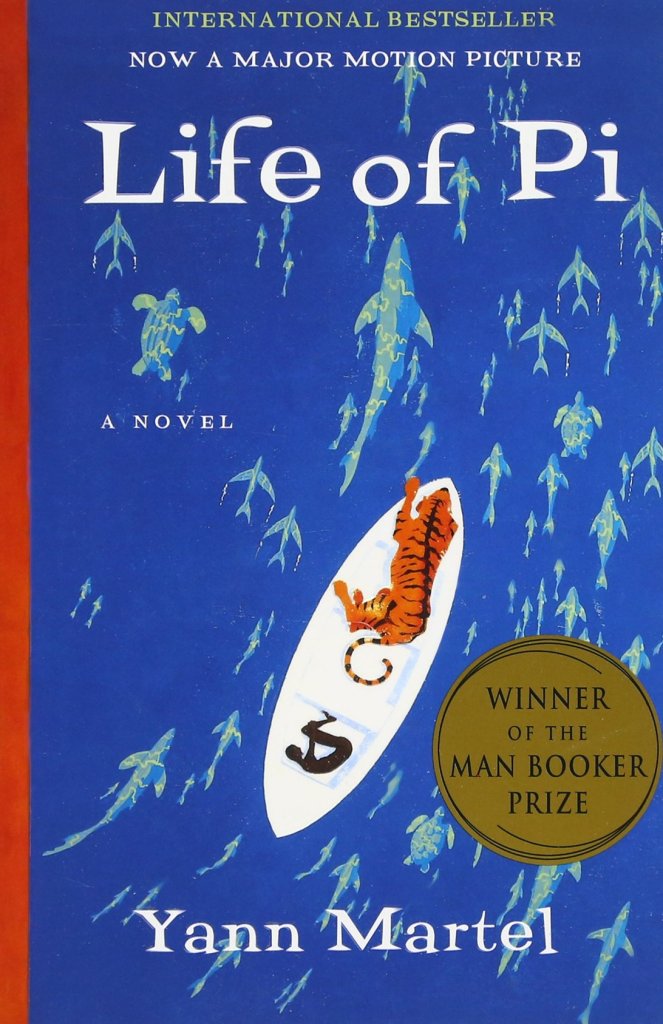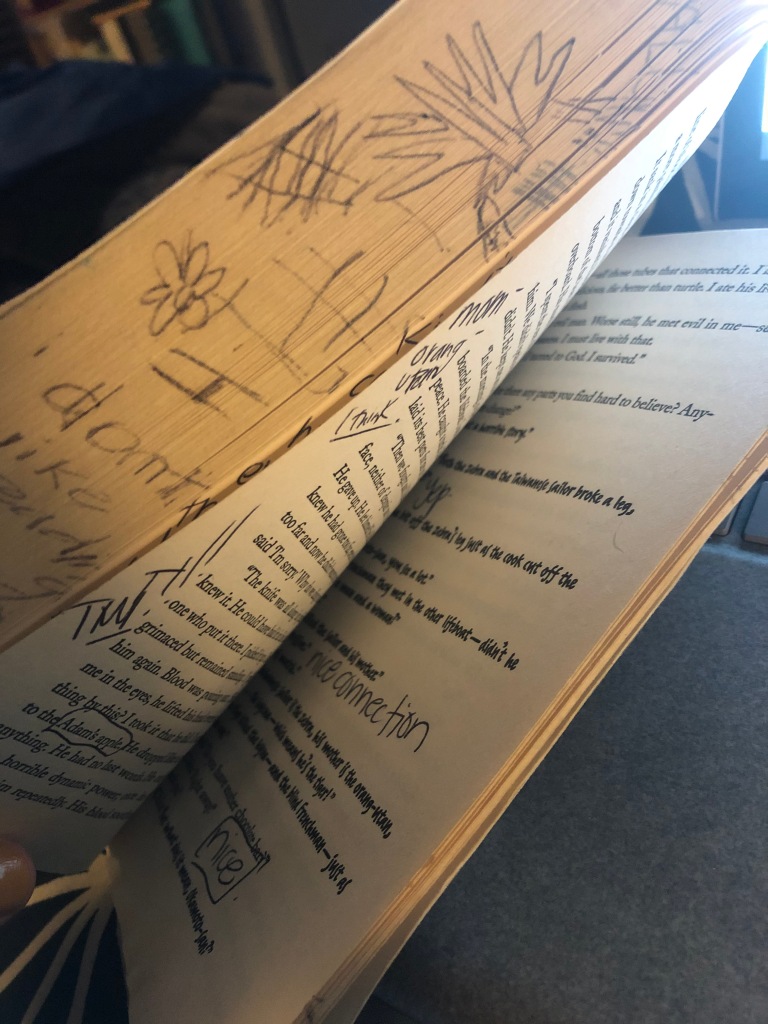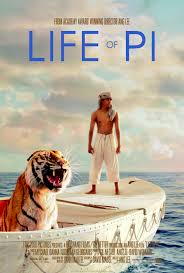I have read Life of Pi a couple of times and I like it. I have reasons, and I’ll give them to you in a sec. I also always leave it a little disappointed. I think my main beef with this book is that Yann Martel tried too hard to sell us his perceived moral. Turns out, what he has to say about religion isn’t all that compelling, but what the book says about guilt, is much more so.
Life of Pi is a fantasy story (which really sits pretty close to magic realism) about an Indian teenager who grows up in the 60s and 70s, the son of a zookeeper and intensely interested in religion. When his family decides to emigrate to Canada, they crate up all the sold animals and embark on a giant tanker ship across the Pacific. After the ship sinks in a storm in the middle of the night, Pi is left alone on a lifeboat with a tiger, a hyena, a chimpanzee, and a wounded zebra. How could he possibly make it more than 250 days without being eaten alive?
Note: If you stop reading halfway through this book, you have not fairly experienced it. I am okay with you disliking it and stopping, but I’m just telling you that it doesn’t work, this time, to judge it based on the first half or even two-thirds. What happens in the last quarter, even the last several pages, is like the chemical at the end of an experiment that crystallizes the solution and shows us what we were doing all along. So.
What I like: the twist (when you realize this story is getting out of hand) and then the double twist (when you realize this book isn’t at all what you thought it was). The detailed description that brings things to life, like you’re really there, stranded on a boat in the middle of the ocean with a tiger and you have boils on your butt. Or you’re eating a raw turtle. Or whatever. The bits of wit and humor. The many science-y facts (many zoological) as well as the keen observation of biological life that brings it into a highly-saturated focus. The thing is, Life of Pi should drag out to make you feel the pain, like The Man and the Sea or The Pearl, so I’m mostly okay with how long it can feel. Also, you like Pi, which is a win for the character, because—in my reading of it—he’s trying to absolve himself. Pi is a character so observant, smart, and passionate that when we put on our Pi suit it’s like we’ve never truly seen the world before and we’re worn raw with how much we perceive and sense and think.
What I don’t like: the twist. How can I like it and not like it? It really seemed to come out of nowhere, but then it settles in and you might even grow to appreciate it, as I did. And perhaps the book does drag out a bit much, especially with the religious stuff. When Martel drags things out at sea, it is because he is vividly painting this alternate reality so that we can almost taste Pi’s regret and his need to do it over. But when Martel hoovers over religious themes for too long, Martel’s trying to sell us a package that is not really what we get. As I said before, this book is not about religion or about God or even about belief (ultimately, at least not in the way it’s often read). It’s about if truth can be more true told differently and, more importantly, what lengths we would go to, to hide our dark side from others and even ourselves. Awkward, especially when Martel brackets the story with a real-fake writer researching a real-fake man and one of the characters tells him, emphatically, “I have a story that will make you believe in God.” This is a rabbit trail. Do not believe it. Wish this line was NOT there.
Besides not helping us believe in God and instead showing us what guilt can do to a man, though, there are juxtaposing layers of the story that beg questions about truth and reality, fiction and fact, similar to The Things They Carried¸ which I happened to just review. It’s not quite as direct or even as successful as O’Brien’s masterpiece, but it would make for some great discussion. Does it matter which version of Pi’s story is real? Which one is told? Which one ends up being truer? Are they essentially the same story? Yadda Yadda. While Martel eventually crashes his own party, I think, we can still strike off on our own conversation.
Here’s what I have to say, with SPOILERS: Like I said, I think the real theme of this book was what happened to a boy who grew into a man very regretful of how he had behaved at a pivotal moment in his life. Remember, when we have doubts cast on the entire story, that includes the end all the way to Pi’s childhood. The only thing we can trust as untainted are the italics, and that only includes his life as an adult. So we know that he surrounds himself with a strange amalgamation of religions at that point, but Pi’s relationship with religion growing up and especially some of the more fanciful moments there, is in question. In other words, even these early stories of religion have to be read through the lens of a shamed boy who did terrible things under great pressure and sought to create a story that would account for the moral truth, the knowable facts, and cocoon his guilt at the same time. Certainly it’s not a book to make one believe in God, as we are led to believe in the intro. In fact, it’s almost like Pi doesn’t understand religion at all, trying to use it as a shield against his own depraved nature, as something to distance himself from his story. Maybe like amulets. Or maybe that is Martel’s point, but it’s not how people seem to interpret it. I have a friend who thinks Pi asserts that all religions are equally false, so belief in any is good. And there is an interesting switch at the end: you think Pi is asserting the truth of all faiths and then we realize he is an untrustworthy narrator and he asks his listeners which story is better and when they say the one with the animals (though it isn’t accurate,) he says, “And so it goes with God.” Which means what?!? The more beautiful life of faith is not based in reality? But it’s still better (whatever that means)? Perhaps that is what Pi is saying. But do I believe him? No, I don’t. Furthermore, I wish this line was also NOT in the book. (SPOILERS over)
Life of Pi is an interesting tale with a pretty cool twist or two, good writing, a little humor, a bit of beauty, and a lot of immersive detail.
PS. I got the craziest copy of this book, used, sight unseen. My daughter thinks it’s kind of amazing or at least funny, but it is seriously defaced to the point of distraction. Photo to the right.
MOVIE:
I have seen it and liked it, but I need to re-watch it to review it for you. I am a fan of Ang Lee. HERE is an old review.
QUOTES:
“…reason, that fool’s gold for the bright…” (p5)
“My fingers, which seconds before had been taste buds savouring the food a little ahead of my mouth, became dirty under his gaze. They froze like criminals caught in the act” (p7).
“Animals in the wild lead lives of compulsion and necessity within an unforgiving social hierarchy in an environment where the supply of fear is high and the supply of food low and where territory must constantly be defended and parasites forever endured. What is the meaning of freedom in such a context?” (p16).
“I know zoos are no longer in people’s good graces. Religion faces the same problem. Certain illusions about freedom plague them both” (p19).
“This was all a bit much for me. The tone was right—loving and brave—but the details seemed bleak” (p28).
“It was my first clue that atheists are my brothers and sisters of a different faith, and every word they speak speaks of faith. Like me, they go as far as the legs of reason will carry them—and then they leap” (p28).
“To choose doubt as a philosophy of life is akin to choosing immobility as a means of transportation” (p28).
“…zoo detractors should realize that animals don’t escape to somewhere but from something” (p41).
“Christianity bustles like Toronto at rush hour. It is a religion as swift as a swallow, as urgent as an ambulance. It turns on a dime, expressed itself in an instant. In a moment you are lost or saved” (p57).
“These people fail to realize that it is on the inside that God must be defended, not on the outside. They should direct their anger at themselves” (p71).
“I wish he hadn’t fretted so much. It’s hard on a son to see his father sick with worry” (p78).
“The ship sank…. Everything was screaming: the sea, the wind, my heart…” (p97).
“I didn’t even notice daybreak. I held on to the oar, I just held on, God only knows why” (p107).
“Without a driver this bus is lost. Our lives are over. Come aboard if your destination is oblivion—it should be our next stop” (p111).
“To lose a brother is to lose someone with whom you can share the experience of growing old, who is supposed to bring you a sister-in-law and nieces and nephes, creature to people the tree of your life and give it new branches” (p127).
“I was no longer crying because of my family or because of my impending death. I was far too mumb to consider either. I was crying because I was exceedingly tired and it was time to get rest” (p131).
“With a tiger aboard, my life was over. That being settled, why not do something about my parched throat?” (p135).
“The only reason I didn’t stand up and beat it off the lifeboat with a stick was lack of strength and a stick, not lack of heart” (p136).
“Every part of you, in the manner most suited to it, falls apart. Only your eyes work well. They always pay proper attention to fear” (p161).
“In my experience, a castaway’s worst mistake is to hope too much and do too little” (p168).
“I have learned since that cargo ships travel too quickly for fish. You are as likely to see sea life from a ship as you are to see wildlife in a forest from a car on a highway” (p176).
“I had in my life looked at a number of starry nights, where with just two colours and the simplest of styles nature draws the grandest of pictures…” (p193).
“It was frightening, the extent to which a full belly made for a good mood” (p213).
“The salt went on eating everything with its million hungry mouths” (p238).
“As my heart exalted Allah, my mind began to take in information about Allah’s works” (p260).
“I did not scream. I think only in movies is horror vocal” (p281).
“What a terrible thing it is to botch a farewell” (p285).
“’If you stumble at mere believability, what are you living for? Isn’t love hard to believe?’” (p297).
“Isn’t just looking upon this world already something of an invention?” (p302).
“’So what happened, Mr. Patel? We’re puzzled. Everything was normal and then…?’ / ‘Then normal sank’” (p316).





